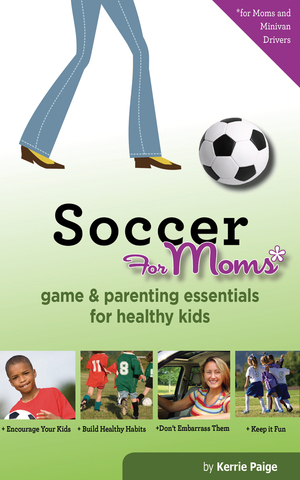Author Explains What Every Soccer Parent Ought to Know
September 30, 2009 (PRLEAP.COM) Entertainment News
Bellingham, WA, author Kerrie Paige offered a seminar for new soccer parents at the Whatcom county youth soccer tournament over the weekend. Kerrie's on a mission to help parents help their kids flourish at any level of play, and she answered the questions that parents ask her most often."When I was offered the opportunity to write the book," says Paige, "I jumped at the chance because it combines three of my favorite things: parenting, writing, and soccer. Having been involved with the sport for nearly 35 years, 15 of those as a parent, there's a very good chance that if it has to do with soccer, I've experienced it. Along the way, I have gotten to know many other experienced Soccer Moms. We don't have all the answers of course, but between us, we have figured out a fair amount about how to get the most out of the soccer parenting experience. I hope that by sharing what my friends and I have learned, I can save other moms some time and frustration, and help them to enjoy the experience as much as I have."
Although her oldest son has now graduated, Paige still spends many weekends watching her two younger boys play. Because she's been around the sport for such a long time, she's often asked to explain what's going on to less-seasoned parents. "What you're looking for depends on the age and ability of your child. "If your child is under 6, it's likely that the game won't look anything like soccer-the ball is almost incidental," says Paige. "Between ages 8 and 11, players begin to get a feel for positional play; however, the emphasis should still be on developing basic skills (i.e. passing, shooting, and dribbling) rather than on team tactics, and by age 12, there begins to be a distinction between different levels of play." Paige reminds parents to keep in mind that "kids who mature earlier may excel until their team mates catch up, and that it is important for parents to watch out for growth-related injuries at this age." She says, "some children may even regress a bit in skills as their bodies grow."
What's the best thing parents can do? "Make sure he is well-prepared to play," says Paige. "That means he's had enough to eat and drink, adequate rest, has proper equipment, and shows up for practices and games on time." She acknowledges that most parents want to support their children from the sidelines, but cautions "be sure to leave any instruction to the coaches." The best way to model good sportsmanship is "by refraining from yelling anything negative at the referee or opposing team." "Finally, say Paige, "remember that only the tiniest percentage of players will go on to play in college or pro, so relax, release your child to the game and enjoy the soccer parenting journey."
To learn more about the nuances of the rules, what to expect at different ages, check out Kerrie's new book, Soccer for Moms: Game & Parenting Essentials for Healthy Kids, available now at Border's.
